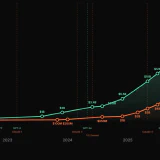The United Internet is Collapsing
The internet is one of my favorite inventions of all time. When nobody was watching, it emerged as a global network without borders, but now the governments are bringing them back with force.

The internet is probably my favorite invention in the whole world.
It’s hard to compare it with penicillin or electricity, of course, but I still remember the awe I experienced when I realized I could talk to some strangers right on my computer or look up anything I wanted. Well, mostly texts since music and videos weren’t exactly available on my 45.2 kbps dial-up connection.
This was around 2005. The internet was paid by the hour. One month my parents got such a huge bill they realized I spent around 100 hours online, and believe me, it was expensive.
They didn’t think much of this new toy but believed it’d change everything. I was reading the news, learning how to code and design, and how to shoot better photos and edit them.
I didn’t have any money, but thankfully, after you got online, everything was practically free back then, supported either by volunteers or online advertising (and piracy, yes). Everyone was on the same Internet, especially if you knew any really popular languages, such as English, Spanish, or Russian. There were no borders, and if any laws were applied at all, they’d be American, so quite liberal regarding what you can and can’t write or say (but click a checkbox that you’re over 13).
Since then, the internet has reshaped economies and enabled entirely new ways of work. My entire career was built through the Internet. I learned everything I needed to land my first job and have worked remotely since then. I work in communications and the internet is where most people consume the news, without even thinking about it. It’s just there.
The internet was only allowed to emerge and develop as it did because nobody was paying attention to this silly little thing. Societies are slow to react, so when they did, it was already too late. If you think about it, many aspects are truly crazy. Anyone can publish anything, Google copies content from all websites, and entire industries have been decimated by the shift online.
As the government woke up, it all started crumbling. First came the authoritarians, who saw a direct threat to their rule since the internet (especially mobile) allowed opposition leaders and protesters to organize or spread alternative views. Because it was a new medium, they would often decide to create a new watchdog or set up innocuous laws they could leverage to erase the content they didn’t want.
Then, to my enormous surprise, the developed countries started slowly adopting practically the same laws as China or Russia (which is rarely a good thing).
First was the economic regulation, as they saw the giant digital economy growing in front of their eyes and adopted things like the “digital” VAT that must collected from online platforms even for cross-border sales (which seems to conflict with the very concept of VAT but OK). I call this digital protectionism.
Then they came for content. Certain governments granted themselves the ability to quickly block websites without ever going to court. Required tech platforms to “land” in their country or region, set up local subsidiaries, and hire people (who, in certain cases, would be just hostages to the regime). Demanded “data retention, so ISPs and online platforms store copies of their customs data.
For some reason, the UK and Australia were at the forefront of offensive laws leading to wide-scale government surveillance (under a veil of protecting children, of course), as both tried to ban end-to-end encryption. Now the entire European Union is trying to do the same, the decision has been delayed but the possibility is out there. In 2023, Signal confirmed they’d leave the UK if they passed this law.
Australia (again), Canada, Spain and France introduced the link tax, a weirdly worded subsidy/tax combo that takes money from Google and Meta and gives it to the largest local news organizations (but not any other organization or small newsrooms). Benedict Evans has a great post explaining why it’s a terrible idea.
But if you do accept the novel theory that links being free for 25 years is a market failure, there’s a further breach of basic logic: if all links have value, why should only newspapers be paid? If all links were paid, then newspapers’ share would be a pittance.
Of course, the European Union is famous for its initiatives, starting with GDPR and now going all-in with DMA. GDPR created a requirement to store “personal data” for EU residents, which led to a noticeable number of websites blocking access from the Union.
Sidenote: Apple and the EU are fighting each other but turned out to be surprising allies against targeted advertising, which funds the free internet for hundreds of million people
Digital Markets Act (DMA) was the latest huge milestone. We still don’t know where it will ultimately lead, but Meta and Apple have already had to adjust their products specifically for the EU. Threads blocked access to all accounts created from the EU for many months. Now, we have learned that Apple won’t release its Apple Intelligence features in the EU.
All these regulations bring us closer to a fragmented internet that will be nothing but a shadow of what we had.
China famously has its own intranet cut off from the rest of the world by the Great Firewall. Russia is building similar capabilities after being sanctioned and ostracized to the point most companies leave its market voluntarily.
The United Internet of America is collapsing. We’re driving head-on into a world where every major country and major economic block carved out its own fragment of the internet with different rules, regulations, and local champions. You might say this is the natural order of things that works in all other industries, and big tech companies will adapt. And you’d be right. But the Internet didn’t work like this, and I believe it was better for the users.
***
What does it mean for us, exactly?
There’s a good chance that, with time, you won’t have access to that popular app or website people are raving about. Both as a consumer or a business, you’d have to use local tools that aren’t necessarily better (most likely worse), especially if the regulations prevent them from having to compete on the world stage.
It’s likely you will find it extremely challenging to break the laws here. Threads’s ban of Europeans from accessing the app was quite bulletproof, and even the VPN couldn’t help. This is just like in the physical world, where a ban or tariffs on certain goods can make it extremely challenging to buy them.




